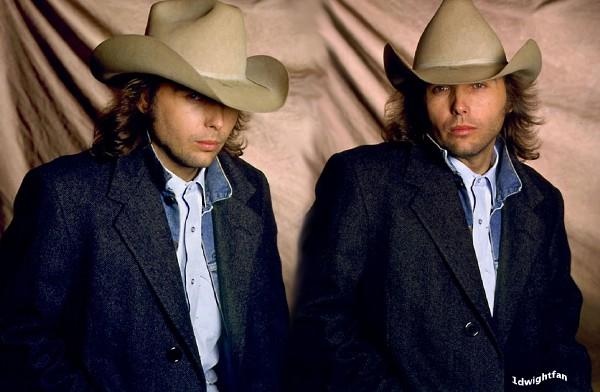
A confession spoken from inches away—“The Distance Between You and Me” lets Dwight Yoakam describe a love that shares a bed but not a heartbeat, turning quiet estrangement into a hard, humming truth.
Key facts first. “The Distance Between You and Me” opens Yoakam’s fourth studio album, If There Was a Way, released October 30, 1990. It was not issued as a single, so it has no chart peak of its own; the album did the climbing—No. 7 on Billboard’s Top Country Albums and No. 96 on the Billboard 200—while five other tracks handled radio duty (“Turn It On, Turn It Up, Turn Me Loose” #11; “You’re the One” #5; “Nothing’s Changed Here” #15; “It Only Hurts When I Cry” #7; “The Heart That You Own” #18). On the LP, the song runs a taut 2:41 and carries Yoakam’s solo writing credit.
Behind the glass, the cut bears the stamp of producer-guitarist Pete Anderson and the room they favored—Capitol Studios, Hollywood—whose clean acoustics fit Yoakam’s Bakersfield steel and West Coast snap. The opener’s arrangement is a small surprise: among the Telecaster bite and pedal-steel sighs you’ll hear banjo tucked into the texture, a color the album deploys sparingly to underline the lyric’s restless motion. (Al Perkins is credited on banjo and steel across the project.) That blend—rootsy instruments in a tight, modern frame—is a big part of why If There Was a Way felt so alive in 1990.
As a scene, the song is devastating because it’s ordinary. Yoakam writes not about slammed doors but about the silence between two people who haven’t left yet. He sketches the minute geometry of separation: breaths heard “only inches” apart, a mattress that feels like a continent, the absurd measurements you make when affection has turned into absence. Critics have noted how the album keeps circling this theme of aloofness—lovers present in body, missing in spirit—and they point to the opener as the thesis, right down to its exasperated images and its unsentimental, forward-tilting groove.
For older listeners, that honesty lands with a particular weight. The song knows that most relationships don’t implode; they erode. We talk less, we sleep back to back, we invent errands. Yoakam refuses melodrama and chooses measurement instead—how far have we drifted, really?—a choice that gives the track its strange tenderness. You can hear the band embody that stubborn clarity: drums that keep their counsel, bass walking without flourish, guitars drawing narrow lines of light around a voice that won’t over-sing the hurt.
Placed at the front of If There Was a Way, the track also frames the album’s broader arc. This is the project where Yoakam widens his palette—hints of soul keys and rock muscle surface elsewhere—without abandoning the Bakersfield grammar that made him. Letting this small, flinty song lead the way was a statement: the record would be about adults telling the truth, in tones as lean as the stories themselves. The commercial story that followed—Top-10 and Top-20 country singles piling up—only confirmed that listeners were ready for that mix of polish and plain talk.
The piece has had a quiet afterlife. Yoakam stripped it down to wood and wire on dwightyoakamacoustic.net (2000), reducing the arrangement until all that’s left is the pulse and the premise—proof that the song’s bones don’t need studio muscle to stand. Other voices heard it too; Sara Evans cut a version in the late ’90s, a graceful nod to a line of writing that treats adult distance with grown up restraint..
What, finally, does “The Distance Between You and Me” mean? It’s a reminder that intimacy isn’t just proximity; it’s attention. The narrator isn’t raging; he’s measuring. He’s the kind of man who will tie a rock to a rope and drop it in the sea of his life just to see how deep the silence goes—and then decide what to do about it. That image, and the banjo’s unshowy twang ticking along beside the backbeat, makes the track feel like a working person’s philosophy: tell the truth gently, and if the truth is distance, name it.
Spin it today and the room changes a shade. The song doesn’t ask for tears. It asks for clarity. And in a catalog famous for bar-floor stompers and highway anthems, this opener’s modesty is its strength. It’s a note pinned to the album’s door that reads, in Yoakam’s careful hand: we’re going to talk about what hurts, simply and well—and the rest of the record keeps that promise